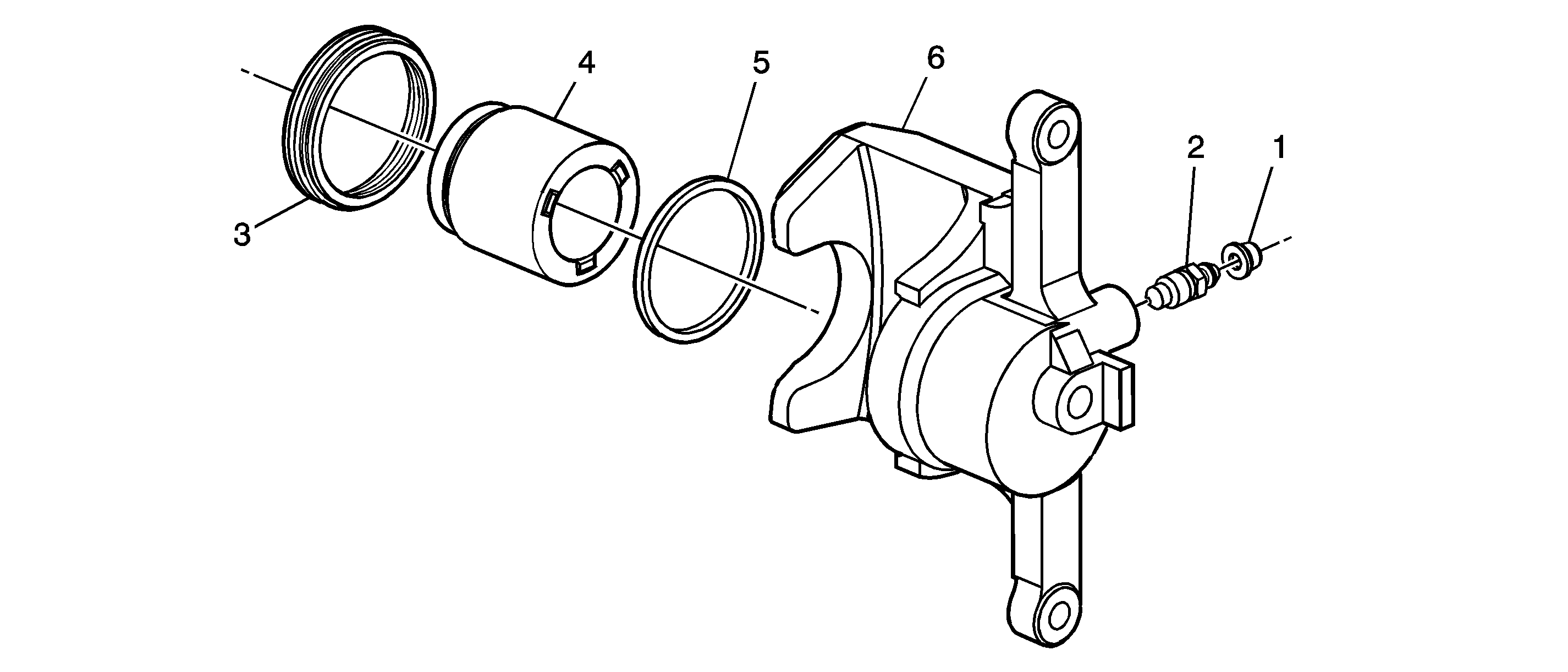Callout
| Component Name
|
|
Warning: Refer to Bleed Procedure Warning in the Preface section.
Warning: Refer to Brake Dust Warning in the Preface section.
Warning: Refer to Brake Fluid Irritant Warning in the Preface section.
Caution: Refer to Brake Fluid Effects on Paint and Electrical Components Caution in the Preface section.
Preliminary Procedures
- Raise the vehicle. Refer to
Lifting and Jacking the Vehicle.
- Remove the rear disc brake caliper. Refer to
Rear Brake Caliper Replacement.
|
1
| Rear Brake Bleeder Valve Cap
|
2
| Rear Brake Bleeder Valve Screw
Caution: Refer to Fastener Caution in the Preface section.
Tighten
10 N·m (89 lb in) |
3
| Rear Disc Brake Caliper Piston Boot
|
4
| Rear Disc Brake Caliper Piston
Procedure
- Do not use abrasives to clean the brake caliper piston or the disc brake caliper bore.
- Place a block of wood against the inside of the caliper body, opposite of the caliper piston, then direct low pressure compressed air through the caliper inlet port to remove the caliper piston.
- During installation apply a thin coat of Delco® Supreme 11 GM P/N 12377967 (Canadian P/N 992667), or equivalent DOT-3 brake fluid from a clean, sealed brake fluid container onto the outer surface area
of the caliper piston.
|
5
| Rear Disc Brake Caliper Piston Seal
Procedure
- Use a small wooden or plastic tool, carefully remove the rear disc brake caliper piston seal from the groove in the caliper seal bore.
- During installation lubricate the new piston seal with Delco® Supreme 11 GM P/N 12377967 (Canadian P/N 992667), or equivalent DOT-3 brake fluid from a clean, sealed brake fluid container.
|
6
| Rear Disc Brake Caliper
Procedure
- Inspect the caliper bore and housing for cracks, scoring, pitting, excessive rust, and/or excessive corrosion. If any of these conditions are present in the caliper bore or housing, replace the caliper assembly.
- If light rust or light corrosion are present in the caliper bore, attempt to remove the imperfection with a fine emery paper. If the imperfection cannot be removed, replace the caliper assembly.
- Clean the brake caliper piston bore and seal counterbore, the caliper piston, and the caliper sleeves with denatured alcohol, or equivalent.
- Bleed the brake system anytime the system is opened for repairs. Refer to
Hydraulic Brake System Bleeding.
|
Callout
| Component Name
|
|
Warning: Refer to DOT 4 Brake Fluid Warning in the Preface section.
Warning: Refer to Bleed Procedure Warning in the Preface section.
Warning: Refer to Brake Dust Warning in the Preface section.
Warning: Refer to Brake Fluid Irritant Warning in the Preface section.
Caution: Refer to Brake Fluid Effects on Paint and Electrical Components Caution in the Preface section.
Preliminary Procedures
- Raise the vehicle. Refer to
Lifting and Jacking the Vehicle.
- Remove the rear disc brake caliper. Refer to
Rear Brake Caliper Replacement.
|
1
| Rear Brake Bleeder Valve Cap
|
2
| Rear Brake Bleeder Valve Screw
Caution: Refer to Fastener Caution in the Preface section.
Tighten
10 N·m (89 lb in) |
3
| Rear Disc Brake Caliper Piston Boot
|
4
| Rear Disc Brake Caliper Piston
Procedure
- Do not use abrasives to clean the brake caliper piston or the disc brake caliper bore.
- Place a block of wood against the inside of the caliper body, opposite of the caliper piston, then direct low pressure compressed air through the caliper inlet port to remove the caliper piston.
- During installation apply a thin coat of brake and clutch fluid Super DOT-4 GM P/N 88958860 (Canadian P/N 88901244), or equivalent DOT-4 brake fluid from a clean, sealed brake fluid container onto the outer surface
area of the caliper piston.
|
5
| Rear Disc Brake Caliper Piston Seal
Procedure
- Use a small wooden or plastic tool, carefully remove the rear disc brake caliper piston seal from the groove in the caliper seal bore.
- During installation lubricate the new piston seal with brake and clutch fluid Super DOT-4 GM P/N 88958860 (Canadian P/N 88901244), or equivalent DOT-4 brake fluid from a clean, sealed brake fluid container.
|
6
| Rear Disc Brake Caliper
Procedure
- Inspect the caliper bore and housing for cracks, scoring, pitting, excessive rust, and/or excessive corrosion. If any of these conditions are present in the caliper bore or housing, replace the caliper assembly.
- If light rust or light corrosion are present in the caliper bore, attempt to remove the imperfection with a fine emery paper. If the imperfection cannot be removed, replace the caliper assembly.
- Clean the brake caliper piston bore and seal counterbore, the caliper piston, and the caliper sleeves with denatured alcohol, or equivalent.
- Bleed the brake system anytime the system is opened for repairs. Refer to
Hydraulic Brake System Bleeding.
|


